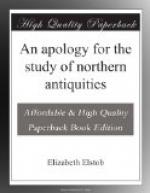You see, Sir, this great Master had his Reserves, and this was one of the Arcana, to which every Novice was not admitted to aspire; this was an Entertainment only for his best Friends, such as he thought worthy of his Conversation; and I do not wonder at it, for he was acquainted not only with the Greek and_ Latin Poets_, but with the best of his own Countrey, as well of ancient as of latter times, and knew their Beauties and Defects: and tho’ he did not think himself obliged to be lavish, in dispersing the Fruits of so much Pains and Labour at random, yet was he not wanting in his Generosity to such as deserved his Friendship, and in whom he discern’d a Spirit capable of improving the Hints of so great a Master. To give greater Probability to what I have said concerning Monosyllables, I will give some Instances, as well from such Poets as have gone before him, as those which have succeeded him. It will not be taken amiss by those who value the Judgment of Sir Philip Sydney, and that of Mr. Dryden, if I begin with Father Chaucer.
#Er it was Day, as was her won to do.#
Again,
#And but I have her Mercy and her
Grace,
That I may seen her at the lefte way;
I nam but deed there nis no more to say.#
Again,
#Alas, what is this wonder Maladye?
For heate of colde, for colde of heate I dye.#
Chaucer’s first Book of Troylus, fol. 159. b.
And since we are a united Nation, and he as great a Poet, considering his time, as this Island hath produced, I will with due Veneration for his Memory, beg leave to cite the learned and noble Prelate, Gawen Douglas, Bishop of Dunkeld in Scotland, who in his Preface to his judicious and accurate Translation of Virgil, p. 4. says,
Nane is, nor was, nor zit sal be,
trowe I,
Had, has, or sal have, sic craft in Poetry:
Again, p. 5.
Than thou or I, my Freynde, quhen we best wene.
But before, at least contemporary with Chaucer, we find Sir John Gower, not baulking Monosyllables;
#Myne Herte is well the more glad
To write so as he me bad,
And eke my Fear is well the
lasse.
To
Henry the Fourth,
King Salomon which
had at his asking
Of God, what thyng him was
leuest crave.
He chase Wysedom unto governyng
Of Goddes Folke, the whiche
he wolde save:
And as he chase it fyl him
for to have.
For through his Witte, while
that his Reigne laste,
He gate him Peace, and Rest,
into his laste.#
Again,
#Peace is the chefe of al the Worldes
Welth,
And to the Heven it ledeth
eke the way,
Peace is of Soule and Lyfe
the Mannes Helth,
Of Pestylence, and doth the
Warre away,
My Liege Lord take hede of
that I say.
If Warre may be lefte, take
Peace on Hande
Which may not be without Goddes
Sande.# [E]




